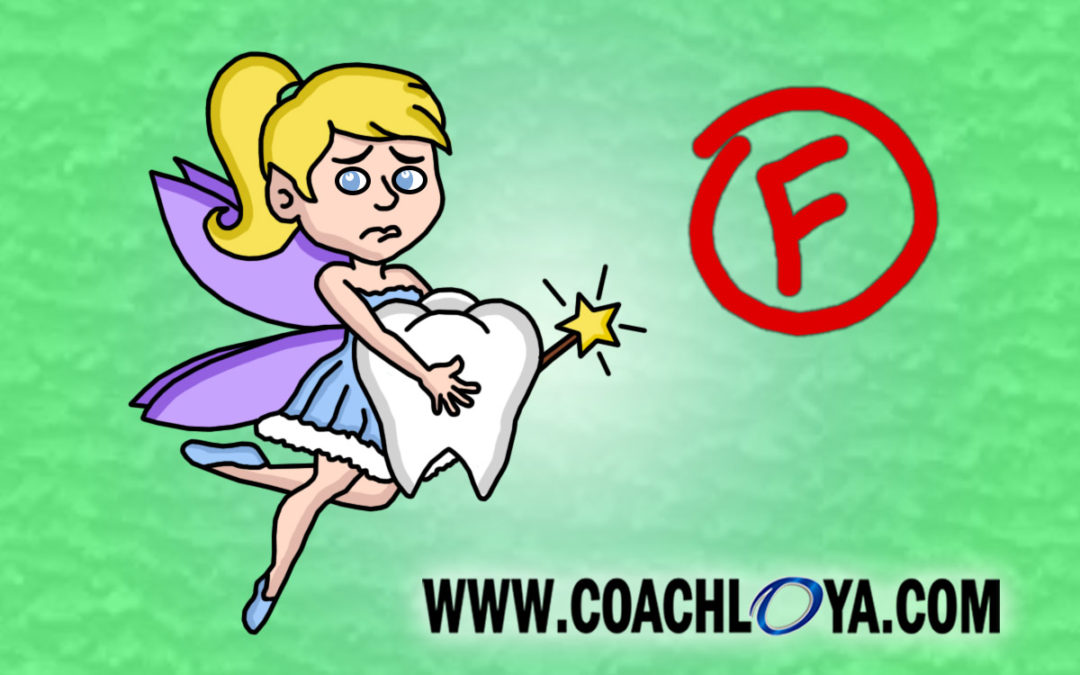The tooth fairy failed. Epically. Twice.
When I’m not traveling for speaking engagements, I have a morning routine that I try to follow. I wake up, drink a small bottle of water, eat a quick breakfast, brush my teeth, and then head into my home office to do some work before the rest of my family gets up.
I’ve discovered myself to be particularly productive during this time. My circadian rhythms are optimized and the stillness of the house minimizes the chances of me getting distracted.
Yesterday morning, I had my office door shut when my youngest daughter barged in. We don’t have a lot of rules in our house when it comes to me working at home. I generally leave my office door open.
Anyone is welcome to enter and interrupt whatever I’m doing if my door is open. But if my door is closed, that means I’m doing something important and they know not to enter unless it’s an emergency.
I immediately knew something was wrong when the door swung open and I saw my teary-eyed daughter holding a baggie in her hand.
“I put my tooth under my pillow last night, but the Tooth Fairy didn’t come,” she said.
A blizzard of emotions engulfed me—shame, embarrassment, anger, etc. My daughter had lost one of her final baby teeth. How could the Tooth Fairy have forgotten such a monumental occasion?
I started to make excuses for the Tooth Fairy: Maybe the Tooth Fairly was really busy last night. Maybe the Tooth Fairy tried to come when you were still awake. Did you stay up too late? Maybe the Tooth Fairy didn’t see your tooth. Are you sure you put it in the right place?
But those were just feeble excuses for inexcusable behavior. The tooth fairy failed, epically, and needed to own that mistake.
When good teammates make mistakes, their initial response should be to take responsibility for their actions. Don’t waste time making excuses or trying to deflect blame. Own the mistake, apologize, and commit to righting the error.
I stopped trying to make excuses for the Tooth Fairy and shifted my focus to consoling my daughter. Thankfully, she agreed to put her tooth back under her pillow and give it another try.
My office door swung open again this morning, and I again saw my daughter standing in the doorway. She didn’t have any tears on her face this time. However, she did have a look of disappointment. She was holding cash in one hand and what looked like a note in the other—along with the same baggie from the day before.
“Well, the Tooth Fairy came last night, Dad. The Tooth Fairy left me some money and an apology note but forgot to take my tooth.”
I cringed as she held up the baggie containing her tooth.
 When my daughter told my wife what happened, my wife looked at me and smirked. She then proceeded to cryptically inform me that she would like to send the Tooth Fairy a text that included a deserving you-had-one-job gif.
When my daughter told my wife what happened, my wife looked at me and smirked. She then proceeded to cryptically inform me that she would like to send the Tooth Fairy a text that included a deserving you-had-one-job gif.
I cringed again.
The Tooth Fairy had failed for the second time in as many days. As I contemplated what to say about the situation, my daughter offered her thoughts:
“You know, the Tooth Fairy has been good to me and never made mistakes like this before. I think we should give the Tooth Fairy a break,” she said. “But if it happens again, I’m going to write Santa a letter and recommend he put the Tooth Fairy on the naughty list.”
I was satisfied with that recommendation.
How the Tooth Fairy responded to the first mistake is an example of how you should respond to making a mistake (own it, apologize, and commit to righting the error). How my daughter responded to the second mistake is an example of how you should respond to an established good teammate making a mistake.
Temper your emotions, consider the value of their past contributions, cut them a break, and tactfully remind them of the consequences should their mistake happen to be repeated. No further discipline nor action is required.
Responding in this manner will be a good teammate move on your part that I am CERTAIN the offending party will appreciate.
As always…Good teammates care. Good teammates share. Good teammates listen. Go be a good teammate.





